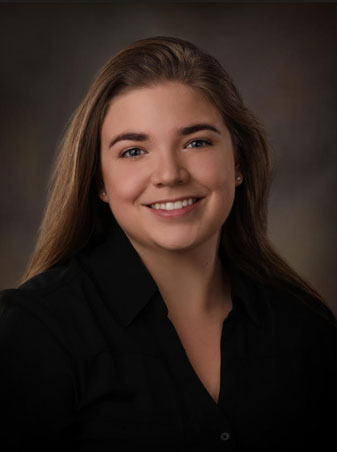April marks the Month of the Military Child, which honors and brings awareness to the 1.6 million military children who face unique experiences and challenges as a result of their parents’ service. Military families move every two to three years on average, which impacts the lives of military children as they change schools and social networks.
At University of Maryland Global Campus (UMGC), we acknowledge and honor military children and understand the challenges they face and overcome. UMGC has been serving military servicemembers and their families since 1947 by providing accessible education no matter where they are throughout the world. This year’s theme is “Celebrating Military Children and Youth: Building Stronger Character and Relationships.” In observance of Month of the Military Child, UMGC is highlighting the faculty and staff in our own community who are military children and sharing how their experiences help serve our students.
Kristin Byerly’s experiences as a military child and parent of military children help her understand the support military students need.
Kristin Byerly is UMGC’s Director of Veterans Initiatives and a faculty member, as well as a self-proclaimed “military brat, veteran spouse, and active-duty mom.” Her father was in the U.S. Navy for 26 years, and she moved six times as a military child. As the spouse of a veteran, Byerly also had the experience of watching her children be military children as they moved eight times, including to Japan twice. Growing up as a military child instilled a strong sense of patriotism in Byerly, even when she lived abroad.
“In Japan, during morning and evening colors, you stopped and waited while the flag was lowered and raised,” says Byerly. “I find even now when I can hear the morning colors from the Navy base down the street, I pause. It gives me a moment to reflect and to think of my son who is currently deployed.”
Byerly learned the importance of adaptability as a military child, as well as the challenges families face as they adjust to new situations.
“You learn to adapt to just about everything, and it caused me to try and see the good in most situations. Some of these experiences are going to impact kids differently,” says Byerly. “Moving from place to place can make some children resilient to constant change and for others it can have the complete opposite effect and develop a sense of insecurity. You learn it’s OK to be sad, it's OK to miss your family members both immediate and extended, but you find the joy where you can.”
With moving being a constant as a military child, Byerly believes in the importance of having a strong support system, no matter where you are.
“I think anything we do in life whether military child or not, the challenges we face will make or break us. The support we have is what will make the difference.” says Byerly. “The military knows that support is needed and tries to ensure that there are networks in place. The friends we made, while we were together for less than three years, I would drop anything for them and know they would do the same. You learn to care about how others are doing because you know how it feels.”
Byerly understands the challenges many servicemembers face, which helps her to better serve students within her role at UMGC.
“Knowing the difficulties of moving, changing schools, finding that one person that will let you sit with them at the lunch table. A parent is taking on the pain of seeing this in their children. As a professor, I understand and work with students as best I can,” says Byerly. “As a member of our Stateside Military Operations team and part of the Veterans Initiatives, the need to help our military members does not stop when they transition out of the service. Understanding what they have handled and how their families have been there to support them, our job is to address their needs as best we can, one family member at a time!”
Stacey Tate’s experience as a military child gave her a global mindset, which helps her serve UMGC students around the world.
Stacey Tate is the Director of Out of State Operations at UMGC and manages the field operations for staff located on military bases and commercial sites in the Eastern region of the United States. With her father being in the military, Tate grew up in Germany and experienced life as a military child abroad.
“I'm proud to be a military ‘brat,’ as we are commonly called by other military children and families. I'm proud to have a father that served his country even though it took him away from us from time to time,” says Tate. “I was blessed to be able to grow up in Germany, a country I still feel is home for me. I learned the language and culture and fell in love. I was able to visit countries all over Europe, whether it was to see castles, beautiful mountains, or places of historical significance. I was able to visit East Germany and the Berlin wall six months before it was torn down.”
Tate’s key takeaways as a military child were resilience, adaptability, and acceptance of new people and different cultures.
“As a military child, friends come and go so you always had to put yourself out there to meet new people. I made so many friends throughout the years, many of whom I still am in contact with. You form special bonds with your friends as a military child as you don't have extended family nearby, so your friends become your extended family,” says Tate. “Another strength I developed as a military child living abroad is acceptance of different cultures. You live amongst the local people and integrate into their culture. You go to school with students from all over the world as well as all the different states in the U.S., so you are immersed in their cultures as well. This is one of the things I am most thankful for growing up as a military child.”
Through her experiences as a military child, Tate shares similarities with many students at UMGC, helping her to better serve them as they succeed.
“I know the challenges that military families face, so I can help them navigate through those challenges while still continuing their studies.”
Dee Dacey Emory’s experience living around the world prepared her to help serve UMGC students no matter where they are.
Dee Emory is a marketing specialist at UMGC. Her father was a career Army officer, the first in his family, who retired as a 2-star general in 1988. Emory has lived in 34 different homes, moving almost every year until she turned eighteen.
“Until I moved from an Army base in Heidelberg, Germany to a suburb of St. Louis at age fifteen, being an army brat was just plain normal,” says Emory. “I felt a part of a very strong and caring community that understood we were all in the same boat, which was, move when and where you are told and make the best of it! So, we did. And we were grateful for the opportunities each move afforded us.”
Reflecting on her time as a military child, some of the strengths Emory developed through her experience include resilience, tolerance, patience, respect, courage, gratitude, and assimilation.
“I have always been able to see the best in every place I’ve lived. When you live life a year at a time, there’s no time to critique or compare where you have been or where you are,” says Emory. “I dove into each new school, participating as much as possible, making friends as quickly as possible, knowing another move was just around the corner. I think the ‘living life one year at a time’ philosophy helped me both appreciate being in the moment and gave me an early understanding of how fleeting time can be.”
Moving each year also gave Emory the experience of living within diverse settings, cultures, and communities. The constant moving kept her relocating and exploring long after her time as a military child, and to this day she equates moving her residence with moving forward in life.
“My family and I got to see more of the U.S. and Europe than most Americans have the opportunity to do in a lifetime. Not only did we see many different parts of the U.S. and the world, we lived in them,” says Emory. “So, we experienced the cultures, the traditions, the food, and the feeling of community in each place.”
Emory understands how difficult the military lifestyle can be and how the transition from military to civilian life can be challenging. Emory’s role helps prospects and students understand how UMGC can help them succeed through higher education opportunities.
“I have been in the marketing area at UMGC for over six years now, and I truly believe in and love UMGC’s mission—to inspire hope, empower dreams, and transform lives . . . one student at a time,” says Emory. “And in particular, to serve working adults, military servicemembers and their families, and veterans who reside in Maryland, across the United States, and around the world.”
This Month of the Military Child, Emory is happy to honor those who serve—both military servicemembers and their families alike.
“Through past community involvement and now through UMGC, I’ve been able to help others throughout the years,” says Emory. “I have deep respect for not only those who choose this life of service, but for their families who sacrifice so much to support them and our country.”
Jennica Schofield’s passion for serving military students began when she watched her military parents pursue their education.
As a military degree plan coordinator at UMGC, Jennica Schofield helps military students succeed in furthering their educational goals.
“As a military degree plan coordinator, I’m a huge fan of my job. I love working for students who are trying to get their degrees done while they’re living a whole other life as a member of the military,” says Schofield. “I know that what I create for them is a just a drop in the bucket of their military career, but it makes me feel good to know that the products our team creates directly serve the student as they serve our country.”
Schofield grew up as a military child, with her mother serving in the U.S. Navy and her father in the U.S. Air Force. Now as a military spouse, she has moved 12 times in her life.
“Not only did this lifestyle help me develop resilience, but it also helped me develop communication skills and rapport building and gave me a go-with-the-flow mindset,” says Schofield. “I had to make new friends every time we moved, and as a three-sport athlete, I had to try out for new teams, find new practice facilities and develop relationships with new coaches and teachers every couple of years.”
It’s not easy to pack up and move every few years, and it’s certainly not easy to walk into a new school or new sports team and start from scratch. Schofield faced these challenges, and they shaped her into the person she is today.
“Being a military child, for me, gave me so many opportunities growing up to practice communication, to exercise grit, to enjoy adventure, and to take risks when it came to opening up to new people. All of these have served me well as an adult,” says Schofield. “It has made me itchy to move every few years. While I love the idea of settling down in one place for a while now that I’m a mom, I also crave adventure. Every time we travel somewhere new, I think ‘Oh, we could get stationed here for a couple years, I’d love to explore this part of the country for a while.’ It instilled in me a love of travel and an ability to make friends anywhere I go.”
Schofield’s passion in her role at UMGC was instilled when she was a military child and watched her parents pursue their education while being servicemembers.
“Seeing my mom at the dinner table at night doing college by correspondence course (before online classes were a thing), I remember her textbooks piled up and stacks of blue books and other test booklets that she would mail back to her university,” says Schofield. “Seeing my parents work so hard to study and achieve advanced degrees was important to me, and it makes me feel good to know that the document I create for our students is helping them do the same thing.”
Today as both a military child, military spouse, and mother of a military child, Schofield is proud to celebrate the Month of the Military Child with her family.
"I celebrate with my own kiddo now! As a child, I didn’t celebrate as much because it was just so ingrained. Every month was the month of the military child in my house. But it’s nice to highlight the challenges military children face and the resiliency they display every deployment, every PCS, every day.”
UMGC honors military children for their resilience and service. We thank all who have served in the U.S. armed forces and are honored to serve servicemembers and their families as they achieve their higher education goals.
Reference on this webpage to any third-party entity or product does not constitute or imply endorsement by UMGC nor does it constitute or imply endorsement of UMGC by the third party.


/blog-inline-military-experience-academic-credit_ph-53martin210621umgc33654_retouched.jpg)


Share This